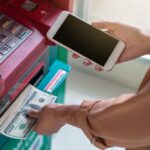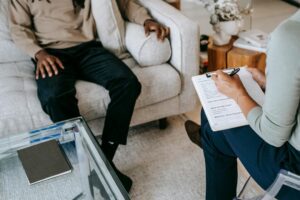Connecting clients with jobs is essential to their self-sufficiency, but it’s not the only way to promote economic security and success. Economic mobility and long-term integration can be improved by establishing broader economic assets such as a credit score, home equity, checking/savings accounts, post-secondary education, retirement savings, and access to tax services. To learn more, see Switchboard’s information guide Promoting Your Clients’ Financial Wellbeing.
Here are five ways you can get started:
1. Build Trust
War and corruption in a client’s country of origin may have instilled a deep distrust and lack of confidence in the security of financial institutions. Building trust with you can be a client’s first step toward trusting the U.S. financial system. Ethnic community-based organizations (ECBOs) and community members can also be vital allies in mitigating the lack of trust. Consider inviting a refugee community leader who has successfully navigated financial systems in the U.S. to come speak at a job readiness class or record his or her story via video for sharing with clients.
2. Provide Financial Capability Training
If your agency doesn’t have the capacity to start a new training program, look for opportunities to incorporate financial topics into your initial interactions with clients and within job readiness sessions. A good place to start these conversations could be talking about IOM loan repayment and building credit history. Identify volunteers who are qualified to provide classroom or one-on-one education on asset building and other financial literacy topics. Resources and curricula are available through several banks, the Federal Deposit Insurance Corporation (FDIC ), and non-profit organizations such as Operation Hope and Prosperity Now. The Consumer Financial Protection Bureau (CFPB) has also released Your Money, Your Goals, a set of financial empowerment materials to help clients meet their financial goals. Ensure that materials are translated or adapted so that they are culturally and linguistically appropriate.
3. Learn What Asset-Building Programs are Available Nationally and Regionally
Educate yourself on ORR programs such as the Microenterprise Development (MED) program and the Individual Development Accounts (IDA) program, as well as other federal programs such as Volunteer Income Tax Assistance (VITA). Identify local asset-building organizations by exploring the Community Wealth Building in the United States Directory. Consider inviting representatives from local organizations to present during job readiness classes or at events focused on asset-building in refugee and immigrant communities.
4. Cultivate Employer Partnerships that Advance Economic Mobility
Seek out employers who are committed to their employees’ financial success. In addition to advocating for career advancement opportunities and living wages, encourage employer partners to provide other asset-building opportunities such as quality benefits, savings programs for major purchases or college tuition, or financial counseling resources. Check out Prosperity Now’s resources for employers interested in providing financial wellness services in the workplace.
5. Take a Holistic, Strengths-Based Approach
Ask clients about their financial success and challenges prior to arrival in the U.S. to understand more about their cultural context and personal strengths. When appropriate, include multiple family members in the decision-making process so as to foster a unified household goal and promote long-term economic security, mobility, and inter-generational wealth. Ensure women have an opportunity to contribute equally and take shared responsibility for household finances to help mitigate potential gender barriers to building or controlling assets.
To learn more, see Switchboard’s information guide Promoting Your Clients’ Financial Wellbeing.
This post summarizes best practices gleaned from a two-day cross-sector collaborative workshop which focused on asset-building strategies for refugees and immigrants. The event took place in Des Moines, IA in April 2019 and was organized by Lutheran Immigration and Refugee Service (LIRS). Many thanks to LIRS and to Laura Wagner, Program Manager for Integration at LIRS, for sharing these learnings with the Switchboard network.










